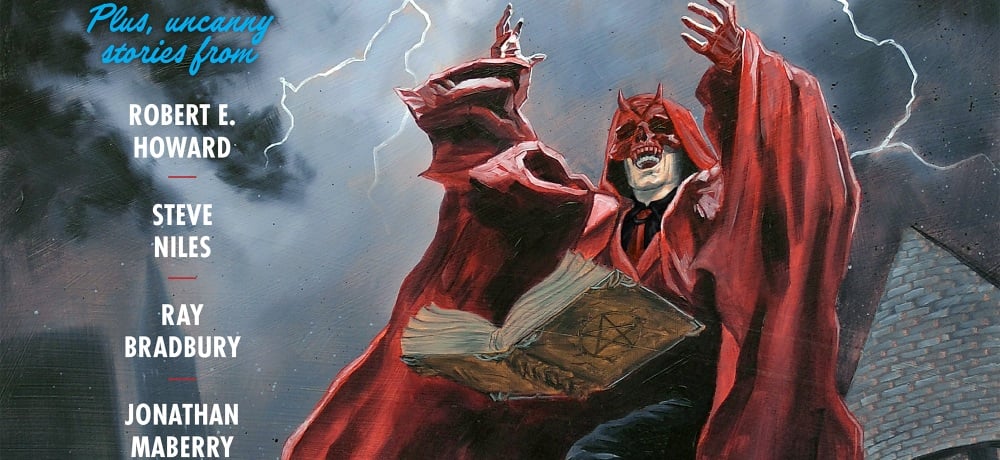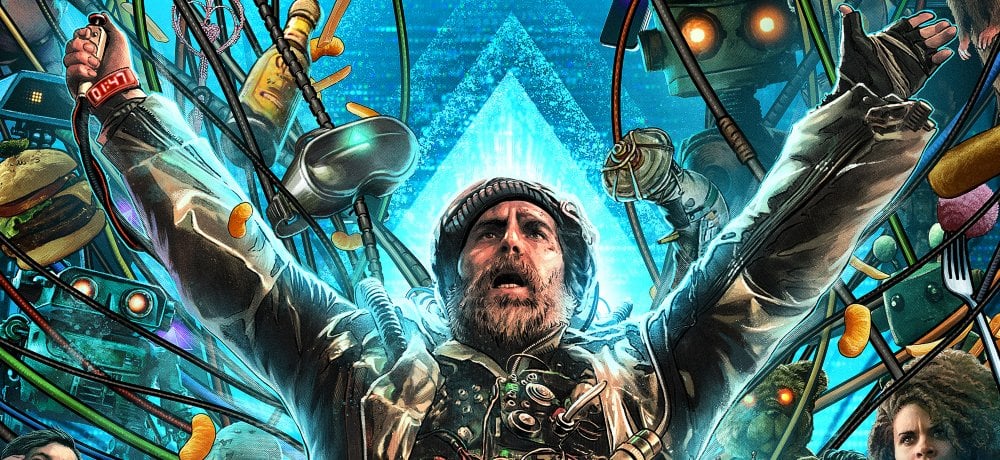





Over the weekend, history was made in the live theatre world of Los Angeles, as Ben Rock and the legendary Stuart Gordon revived the stage play version of Kurt Vonnegut Jr.’s novel The Sirens of Titan for the Sacred Fools Theater. Gordon, who first tackled the darkly comedic sci-fi tale 40 years ago for Chicago’s Organic Theater, once again handled the screenplay adaptation for this new take on the classic story of a man who must lose everything to understand what life truly is all about. The result is a wildly entertaining exploration of what it means to be human, as well as a deeply moving experience that I enjoyed immensely.
After the premiere performance this past Friday, Daily Dead had the opportunity to chat with both Rock and Gordon (who are reteaming once again after a successful collaboration on Taste, a cannibal-themed dramatic production that also played at Sacred Fools) about taking on the timeless messages of The Sirens of Titan, the differences of adapting Vonnegut Jr.’s material in the 1970s versus now, how Jerry Garcia wanted to make a feature film version of the book at one point (with Bill Murray in a starring role), and more.
The Sirens of Titan runs at the Sacred Fools Theater through May 6th, 2017, and for more information or to purchase tickets, click HERE.
Congrats on tonight, guys. I had a lot of fun and the crowd was a blast. Let’s go ahead and start with you, Stuart. This was something that you took on 40 years ago, which blows my mind, and here you are once again taking on this story. What was different for you this time around, versus the first time you adapted the book?
Stuart Gordon: Well, it's interesting. We approached that first production very differently than this one. Vonnegut, when he wrote the book, was commenting on World War II, and Rumfoord, I think, is supposed to be Roosevelt, actually, and we really played that up in our productions. We had Dennis Franz playing Rumfoord, and he did it with the cigarette holder, where he talked like Roosevelt, and the character of Beatrice was Eleanor Roosevelt. My wife played the part, so we had fake teeth for her so she would look like Eleanor Roosevelt.
So, it was a wholly different approach to the material. And Vonnegut was surprised because he said no one had ever realized that's really what the book was about, that it was about him feeling used during the war. But now, doing it 40 years later, that seems like such a distant memory. Most people were losing many of those people who were actually in World War II.
When Ben brought it back, I hadn't read the play in years. It still seemed very fresh, though, and it seemed very much about today. Ben was explaining some of his ideas, and I thought they sounded great.
Ben, as I was reading your director’s note in the program booklet, I thought it was interesting that this was a story you had been a fan of for some time. Then, you and Stuart worked together a few years ago on Taste, and here you are now collaborating on this story. It almost feels like kismet in a way. Was that at all daunting for you, Ben?
Ben Rock: Oh, yeah. To me, it's like I'm trying to honor two people whose work I admire outrageously, and that's Kirk Vonnegut and Stuart Gordon, and I want to make sure that I do them both justice at the same time. Vonnegut was that artist that really, really first sunk into me, and I became obsessed with him as a writer. He's one of the writers whose work I return to over and over again. And I've known that this adaptation existed for 26 years, so yeah, it was daunting because you don't want to f--- it up. You want to make sure you get it exactly right, or you want to get it as right as you can. And, obviously, there are budget limitations and schedule limitations with the way this stuff goes together.
There was no limit to how good I wanted it to be, and I had a really specific idea. Then, you slam into reality and have to figure out what to cut and whatever, but I'd say we got as much as we possibly could up here on stage. Plus, we had an amazing cast, which is really the most important thing to get you through a show. It's been a joy and it's been the most work I've probably ever put into a play. I don’t think people realized how f---ing ambitious it was going to be when we started.
Stuart Gordon: And yeah, you do have a really, really great cast.
What's really interesting is that you mentioned that this is something that feels as relevant now as it did 40 years ago, and I do agree with that sentiment. How early did you start working on this, and had you known where things were heading politically when you started?
Ben Rock: Well, I proposed the show before Trump was elected president. I proposed it about two years ago, so at that time it was science fiction that Trump would end up winning. But it was weird once he did win and the reality of that sunk in. I think that probably a lot of people doing stuff like this start seeing these eerie parallels. We tried to latch onto some of them, but we tried to not hammer it in, either. We tried to not make it too specifically about Trump because it's not really that kind of a thing. It's more about the way we're all being manipulated more than anything.
Stuart, in your note in the play program, you mentioned how Kurt was surprised with your first adaptation of his story because you were almost too literal with your adaptation of it. Is it a challenge when you’re trying to keep in line with the spirit of the material you’re working with, but then you also have to find a way to make it into something new?
Stuart Gordon: Yeah, we were truly respectful with how we approached it. He said to me, "You've got to just make this your own." And he encouraged me to really kind of go crazy with it. I thought about him a lot when we were working on this. I didn't realize how much I missed him.
Ben Rock: And when you did the original adaptation, didn't Jerry Garcia at some point reach out to you?
Stuart Gordon: Yeah, he did. Jerry Garcia was a huge fan of this book, and he wanted to make a movie out of it. He'd heard about our production, and he had me come out to San Francisco and meet with him and talk to him about it. That was pretty hilarious. He wanted to make a movie with Bill Murray playing Malachi Constant, which would've been pretty cool.
Opening night is now over. How does that feel and what are you guys anticipating the most about the rest of the run of the show?
Stuart Gordon: I really like seeing people's reactions to this because some people are fans of the book, and so they know it well. Others have absolutely no idea what they're in for, and I kind of love that, too. So when Jesse Merlin [who plays Salo] comes bouncing out on stage, it's like, "What is happening?" We're literally on another planet, and I love that.
Ben Rock: I've been working on this for so long now, and I've been taking it so seriously, so it wasn't really until last night, as I was watching Jesse Merlin bouncing around like a tangerine with legs, and watching Tim Kopacz dressed as a giant dog, where I was like, "This is actually kind of loony." It is way out there [laughs].
But, when I read the book for the first time, it was like I was reading a more philosophical version of The Hitchhiker's Guide to the Galaxy. When I got to the end, it really nailed me. Like, literally, that last line just tears me to shreds every time. It's a weird magic trick, and it was something where I really had to trust both Vonnegut's work and Stuart's work, because it does swing from completely absurd to very poignant and back again. But as long as we treat the characters like they're real people in these absurd situations, my hope was that it would have an emotional resonance, too.
Stuart Gordon: That's the thing about Vonnegut; he can be very satirical and cynical, but he's got a lot of heart.
---------
Photos by Jessica Sherman: